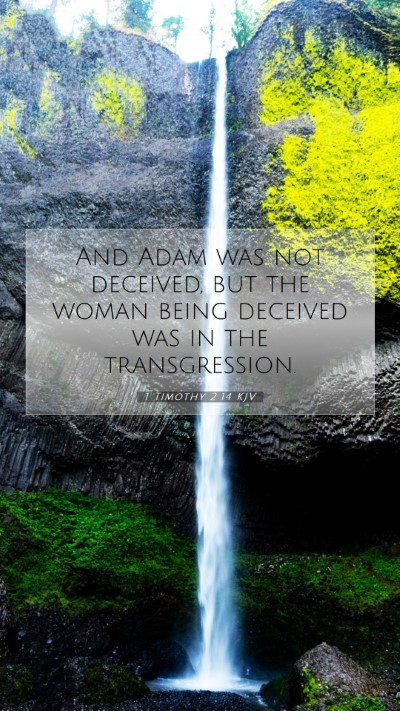Old Testament
Genesis Exodus Leviticus Numbers Deuteronomy Joshua Judges Ruth 1 Samuel 2 Samuel 1 Kings 2 Kings 1 Chronicles 2 Chronicles Ezra Nehemiah Esther Job Psalms Proverbs Ecclesiastes Song of Solomon Isaiah Jeremiah Lamentations Ezekiel Daniel Hosea Joel Amos Obadiah Jonah Micah Nahum Habakkuk Zephaniah Haggai Zechariah Malachi1 Timothy 2:14 Meaning
What is the meaning of 1 Timothy 2:14?
And Adam was not deceived, but the woman being deceived was in the transgression.
1 Timothy 2:14 Bible Verse Meaning
Bible Verse Commentary on 1 Timothy 2:14
Verse Reference: 1 Timothy 2:14 - "And Adam was not deceived, but the woman being deceived was in the transgression."
Overview of the Verse
The verse focuses on an important theological point regarding the fall of humanity, emphasizing the nature of deception and the roles of Adam and Eve in sinning against God. This passage is often referenced in discussions about gender roles and the importance of obedience to God’s commands.
Commentary Insights
-
Matthew Henry:
Henry explains that Paul focuses on the order and consequences of sin to highlight that Adam was not led into transgression by deception, unlike Eve who was. This draws attention to the idea of responsibility and the nature of temptation. Henry emphasizes that Eve's deception illustrates the vulnerability of the human heart and suggests the need for vigilance in faith.
-
Albert Barnes:
Barnes comments on the implications of Paul's statement regarding the roles of men and women. He states that Eve’s deception serves as a cautionary note about the influence of false teachings and the importance of staying true to the faith. Barnes also touches on the cultural contexts of the time, suggesting that Paul’s remarks were meant to correct misconceptions regarding women in leadership roles within the church.
-
Adam Clarke:
Clarke provides a thorough exegesis of the verse, mentioning the Greek terms and their significance in understanding Paul’s message. He argues that the fall highlights both the gravity of sin and the importance of sound doctrine. Clarke highlights that the focus is not merely on Eve’s failure but also on the need for both genders to seek wisdom and understanding to avoid spiritual deception.
Theological Implications
This verse has been interpreted in various ways throughout Christian history, often sparking debates about the roles of women in the church and society. The key theological takeaways include:
- Nature of Sin: Understanding sin’s entry into the world is crucial for Christians, and this verse underscores the differences in how sin was approached by Adam and Eve.
- Gender Roles: The verse prompts discussions about scriptural interpretations relating to gender and authority. It raises the question of whether the implications extend beyond the immediate context of Genesis.
- Spiritual Deception: The warning against deception is significant for believers, suggesting that discernment and knowledge of God’s word is essential in navigating faith.
Application for Believers
This passage encourages believers to reflect on several important points:
- Be proactive in studying Scripture to understand its teachings properly and to guard against misinterpretation.
- Consider the cultural and historical context in which biblical texts were written to glean relevant applications for today.
- Value the need for mutual support and growth in wisdom within Christian communities.
Cross References
- Genesis 3:6-7: The account of the fall and the actions of Adam and Eve.
- Romans 5:12: Discusses sin entering the world through one man.
- 1 Timothy 2:11-12: Instructions regarding women's roles in the church.
Conclusion
This analysis of 1 Timothy 2:14 illuminates the complexity of its meanings and the implications for understanding both personal faith and church dynamics. As such, this verse serves as a vital piece of the larger theological puzzle regarding human interactions with God’s commands and the enduring significance of Scripture.
Further Study Resources
If you wish to dive deeper into the meanings of Bible verses, there are many Bible study tools and Bible study resources available online, offering insights on Biblical exegesis and Bible study lessons. Consider forming Bible study groups to explore these texts collectively, enhancing your understanding Scripture.


